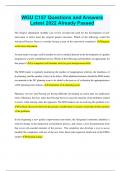C157 for wgu essentials - Study guides, Class notes & Summaries
Looking for the best study guides, study notes and summaries about C157 for wgu essentials? On this page you'll find 75 study documents about C157 for wgu essentials.
Page 4 out of 75 results
Sort by
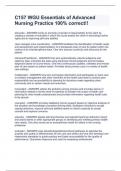
-
C157 WGU Essentials of Advanced Nursing Practice 100% correct!!
- Exam (elaborations) • 4 pages • 2024
-
Available in package deal
-
- $9.49
- + learn more
C157 WGU Essentials of Advanced Nu advocate - ANSWER works to promote a transfer of responsibility to the client by creating a climate of mutuality in which the nurse assists the client in exercising his/her rights and in improving self-care abilities case manager (care coordinator) - ANSWER facilitates the identification of health needs and development and implementation of a therapeutic plan of care for patient within the context of an interdisciplinary team. One who assures continuity and...
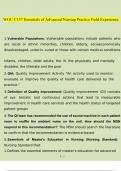
-
WGU C157 Essentials of Advanced Nursing Practice Field Experience
- Exam (elaborations) • 77 pages • 2024
-
- $21.49
- + learn more
WGU C157 Essentials of Advanced Nursing Practice Field Experience 1. Vulnerable Populations: Vulnerable populations include patients who are racial or ethnic minorities, children, elderly, socioeconomically disadvantaged, underin- sured or those with certain medical conditions Infants, children, older adults, the ill, the physically and mentally disabled, the illiterate and the poor 2. QIA: Quality Improvement Activity "An activity used to monitor, evaluate or i...
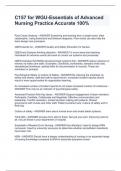
-
C157 for WGU-Essentials of Advanced Nursing Practice Accurate 100%
- Exam (elaborations) • 7 pages • 2024
-
Available in package deal
-
- $11.49
- + learn more
Root Cause Analysis - ANSWER Examining and learning from a single event, often catastrophic. Using flowcharts and fishbone diagrams. Flow charts can also help the team design new processes. QSEN stands for - ANSWER Quality and Safety Education for Nurses QSEN and Systems thinking objective - ANSWER To move away from blaming individuals for adverse events and work to correct our systems and processes. QSEN indicates that MSNs should promote systems that - ANSWER reduce reliance on memory...
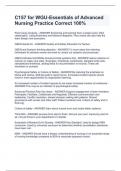
-
C157 for WGU-Essentials of Advanced Nursing Practice Correct 100%
- Exam (elaborations) • 7 pages • 2024
-
Available in package deal
-
- $10.99
- + learn more
Root Cause Analysis - ANSWER Examining and learning from a single event, often catastrophic. Using flowcharts and fishbone diagrams. Flow charts can also help the team design new processes. QSEN stands for - ANSWER Quality and Safety Education for Nurses QSEN and Systems thinking objective - ANSWER To move away from blaming individuals for adverse events and work to correct our systems and processes. QSEN indicates that MSNs should promote systems that - ANSWER reduce reliance on memory...
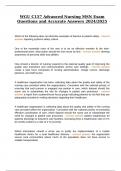
-
WGU C157 Advanced Nursing MSN Exam Questions and Accurate Answers 2024/2025
- Exam (elaborations) • 8 pages • 2024
-
- $11.49
- + learn more
WGU C157 Advanced Nursing MSN Exam Questions and Accurate Answers 2024/2025 Which of the following does not describe examples of barriers to patient safety - correct answer reporting systems safety culture. One of the essentials roles of the msn is to be an effective member fo the inter-professional team, what action should the msn nurse do first - correct answer develop awareness of personal skills and abilities How should a director of nursing respond to the national quality goal of i...
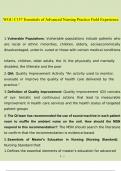
-
WGU C157 Essentials of Advanced Nursing Practice Field Experience
- Exam (elaborations) • 77 pages • 2024
-
- $21.59
- + learn more
WGU C157 Essentials of Advanced Nursing Practice Field Experience 1. Vulnerable Populations: Vulnerable populations include patients who are racial or ethnic minorities, children, elderly, socioeconomically disadvantaged, underin- sured or those with certain medical conditions Infants, children, older adults, the ill, the physically and mentally disabled, the illiterate and the poor 2. QIA: Quality Improvement Activity "An activity used to monitor, evaluate or i...
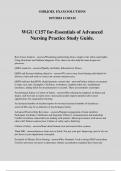
-
WGU C157 for-Essentials of Advanced Nursing Practice Study Guide.
- Exam (elaborations) • 7 pages • 2024
-
- $11.49
- + learn more
ld promote systems that - answerreduce reliance on memory to make care safer. Examples: Checklists, worksheets, standard order sets, standardized timeliness, adding fields for documentation in records. These are reminders or prompts. Psychological Safety or Culture of Safety - answerBy reducing the emphasis on blame and shame, staff feel safe to report errors. Increased incident reports should result in more opportunities for organization learning. An increased number of incident reports d...

-
WGU C157 Essentials of Advanced Nursing Practice Field Experience
- Exam (elaborations) • 77 pages • 2024
-
- $21.49
- + learn more
WGU C157 Essentials of Advanced Nursing Practice Field Experience 1. Vulnerable Populations: Vulnerable populations include patients who are racial or ethnic minorities, children, elderly, socioeconomically disadvantaged, underin- sured or those with certain medical conditions Infants, children, older adults, the ill, the physically and mentally disabled, the illiterate and the poor 2. QIA: Quality Improvement Activity "An activity used to monitor, evaluate or i...
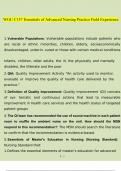
-
WGU C157 Essentials of Advanced Nursing Practice Field Experience
- Exam (elaborations) • 77 pages • 2024
-
- $18.99
- + learn more
WGU C157 Essentials of Advanced Nursing Practice Field Experience 1. Vulnerable Populations: Vulnerable populations include patients who are racial or ethnic minorities, children, elderly, socioeconomically disadvantaged, underin- sured or those with certain medical conditions Infants, children, older adults, the ill, the physically and mentally disabled, the illiterate and the poor 2. QIA: Quality Improvement Activity "An activity used to monitor, evaluate or i...
WGU C157 for WGU-Essentials of Advanced Nursing Practice Exam Resources BUNDLED 100% VERIFIED

Did you know that on average a seller on Stuvia earns $82 per month selling study resources? Hmm, hint, hint. Discover all about earning on Stuvia



